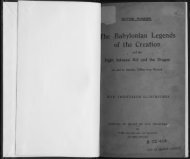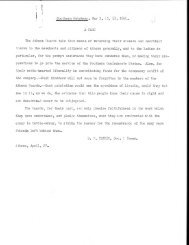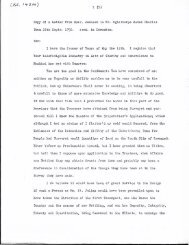Create successful ePaper yourself
Turn your PDF publications into a flip-book with our unique Google optimized e-Paper software.
796 HABPEB'S WEEKLY. [DECEMBER 13,<strong>1862</strong>.<br />
TUB KEBEL ENCAMPMENT AT DEUIIY'S BLUFF, JAMES EIVEE.—SKETCHED BY Mn. VIZKTEI LY.—[SEE PACK 795.]<br />
THE EEBEL FORT DAELING, ON DRURY'S BLUFF, JAMES RIVER.—SKETCHED BY MR. VIZETELLY.—[SEE PAOR 795.J<br />
SLIDELL'S HOUSE IN LOUISIANA.—SKETCHED BT A NAVAL OFFICES-[SEK PAOE 795.]<br />
DECEMBER 13, <strong>1862</strong>.] HARPER'S WEEKLY. 797<br />
KliV. MOKGAX L. D1A, KLC FOK OF '1UINITY CIIUKCH, NEW YORK.<br />
[PllOTOGBAPUED BY BEADV.J<br />
THE KE\V RECTOR OF TRINITY.<br />
WE publish herewith a portrait <strong>of</strong> EEVKKEXD<br />
MORGAN- L. Dix, the new Rector <strong>of</strong> Trinity Church,<br />
New York. Mr. L)ix is a son <strong>of</strong> Major-General<br />
John A. Dix. Ho was born in New York about<br />
the year 1830, was educated at Columbia Col<br />
lege, and entered the ministry on the completion<br />
<strong>of</strong> his studies. He was elected some years ago<br />
Assistant-Rector <strong>of</strong> Trinity, and was recommended<br />
by the Inte Dr. Beirian as the best man to succeed<br />
him. Mr. Dix is widely known as a faithful and<br />
laborious servant <strong>of</strong> Christ. He devotes his time<br />
and his means to the relief <strong>of</strong> the poor and afflict<br />
ed, and among this class enjoys a popularity not.<br />
surpassed by that <strong>of</strong> any other clergyman in the<br />
metropolis. His elevation to the rectorship <strong>of</strong><br />
Trinity at his age foreshadows a great future for<br />
him in the Episcopal Church. Mr. Dix is an un<br />
married man.<br />
[Entered nccordliiB to Act <strong>of</strong> Congress, iu the Year 1802,<br />
by Hnrper & Hrotliers, in the Clerk's Office <strong>of</strong> the Dia-<br />
triet Court for the Soutlieru District <strong>of</strong> New York.]<br />
NO NAME.<br />
Bv WILKIE COLLINS,<br />
ACTUOB Ot "T11K WOHAN IN WHITE," "DEAD SKOBIT,"<br />
ETC., ETC.<br />
ILLUSTRATED BY JOHN M'LENAN.<br />
13T Printed, from tlie UVtcintiscript aild<br />
early l>ro<strong>of</strong>-sheets purchased, by tlie<br />
froprietoru <strong>of</strong> "<strong>Harper's</strong> "<strong>Weekly</strong>."<br />
BETWEEN THE SCENES,<br />
i.<br />
FROM HISS GAItTII TO MR. PENDRIL.<br />
" WKSTMOBLANU HOCBX, Jan. 3,1843.<br />
DEAR MB. PENDRIL,—I write, as you kindly<br />
requested, to report how Norah is going on, and<br />
to tell you what changes I see for the better iu<br />
the state <strong>of</strong> her mind on the subject <strong>of</strong> her sister.<br />
" I can not say that she is becoming resigned<br />
to Magdalen's continued silence—I know her<br />
fnithfnl nature too well to say it. I can only tell<br />
you that she is beginning to find relief from the<br />
heavy pressure <strong>of</strong> sorrow and suspense in new<br />
thoughts and new hopes. I dotibt if she has yet<br />
realized this in her own mind; but I sec tire re<br />
sult, although she is not conscious <strong>of</strong> it herself.<br />
I sec her heart opening to the consolation <strong>of</strong> nn-<br />
othcr interest imd another love. She has not<br />
said a word to me on the subject, nor have I<br />
said a word to her. But as certainly as I know<br />
that Mr. George Bartram's visits have lately<br />
grown more and more frequent to the family at<br />
Portland Place, so certainly I can assure you<br />
that Norah is finding a relief nndcr her suspense<br />
•which is not <strong>of</strong> my bringing, and a hope iu the<br />
future which I have not taught her to feel.<br />
"It is needless for me to say that I tell yon<br />
this in the strictest confidence. God knows<br />
whether the happy prospect which seems to me<br />
to ba just dawning will grow brighter or not as<br />
time goes on. The <strong>of</strong>tcner I sec Mr. Georpc<br />
Bartram—and he has called on me more than<br />
once—the stronger my liking for him prows.<br />
To my poor judgment lie seems to be n gentle<br />
man, in the highest and truest sense <strong>of</strong> the word.<br />
If I could live to see Norah his wife, I should<br />
almost feel that I had lived long enough. But<br />
who can discern the future? We have suffered<br />
so much that I am afraid to hope.<br />
" Have you heard any thing <strong>of</strong> Magdalen ? I<br />
don't know why or how it is but since I have<br />
knowu <strong>of</strong> her hiisliahd's death my old tcudcr-<br />
ncss for her seems to<br />
cling to me more ob<br />
stinately than ever.—<br />
Always yours truly,<br />
"HAIUUET GAKTU."<br />
II.<br />
FROM Mn. TENDRIL<br />
TO MISS GARTH.<br />
"SrEi-EST., Jan. 4,1848.<br />
"MY DEAR Miss<br />
GARTH, — Of Mrs.<br />
Noel Vanstouc herself<br />
I have heard nothing.<br />
But I have learne'd<br />
since I saw you that<br />
the report <strong>of</strong> the po<br />
sition in which she is<br />
left by the death <strong>of</strong><br />
her husband may lie<br />
depended on as the<br />
truth. No legacy <strong>of</strong><br />
any kind is bequeath<br />
ed to her. Her name<br />
is not once mentioned<br />
in her husband's will.<br />
" Knowing what wo<br />
know, it is not to be><br />
concealed that this<br />
circumstance threat<br />
ens us with more em<br />
barrassment, and per<br />
haps with more dis<br />
tress. Mrs. Noel Van-<br />
stone is not the wo<br />
man to submit without<br />
a dcsiieratc resistance<br />
to the total overthrow<br />
<strong>of</strong> all her schemes<br />
and all her hopes.—<br />
The mere fact that<br />
nothing whatever has<br />
bocu heard <strong>of</strong> her<br />
since her husband's<br />
death is suggestive to<br />
my mind <strong>of</strong> serious<br />
mischief to come. In<br />
her situation and with her temper the quieter<br />
she is now the more invetcrately I, for one,<br />
distrust her in the future. It is impossible to<br />
say to what violent measures her present ex<br />
tremity may not drive her. It is impossible<br />
to feel sure that she may not be the cause <strong>of</strong><br />
some public scandal this time which may affect<br />
her innocent sister as well as herself.<br />
"I know you will not misinterpret the motive<br />
which has led me to write these lines; I know<br />
you will not think that I am inconsiderate enough<br />
to cause you unnecessary alarm. My sincere<br />
anxiety to see that happy prospect realized to<br />
which yonr letter alludes has caused me to write<br />
far less reservedly than I might otherwise haro<br />
written. I strongly urge you to use your in-<br />
fiuence, on every occasion when you can fairly<br />
exert it, to strengthen that growing attachment,<br />
and to place it beyond the reach <strong>of</strong> any coming<br />
disasters, while you have the opportunity <strong>of</strong> do<br />
ing so. When I tell you that the fortune <strong>of</strong><br />
which Mrs. Noel Vanstone has been deprived is<br />
entirely bequeathed to Admiral Bartram—and<br />
when I add that Mr. George Bartram is gener<br />
ally understood to be his uncle's heir—you will,<br />
I think, acknowledge that I am not warning<br />
you without a cause.<br />
" Yours most truly,<br />
"WILLIAM TENDRIL."<br />
III.<br />
FROM ADMIRAL BARTRAM TO MRS. DnAKE<br />
(HOUSEKEEPER AT si. CRUX).<br />
"ST. CEDX, Jan. 10, 1348.<br />
" MRS. DRAKE,—I have received your letter<br />
from London, stating that you have found me a<br />
new parlor-maid at last, and that the girl is<br />
ready to return with you to St. Crux, when your<br />
other errands in town allow you to come hack.<br />
"This arrangement must be altered imme<br />
diately, for a reason which I am heartily sorry<br />
to have to write.<br />
" The illness <strong>of</strong> my niece, Mrs. Girdlesronc—<br />
which appeared to be so slight as to alarm none<br />
<strong>of</strong> us, doctors included—has ended fatally. I<br />
received this morning the shocking news <strong>of</strong> her<br />
death. Her husband is said to be quite frantic<br />
with grief. Mr. George has already gone to his<br />
brother-in-law's to superintend the last melan<br />
choly, duties, and I must follow him before the<br />
funeral takes place. We propose to take Mr.<br />
Girdlestone away afterward, and to try the ef<br />
fect on him <strong>of</strong> change <strong>of</strong> place and new scenes.<br />
Under these sad circumstances I may be absent<br />
from St. Crux a month or six weeks at least—<br />
the house will be shut up—and the new servant<br />
will not be wanted until my return.<br />
" You will therefore tell the girl, on receiving<br />
this letter, that a death in the family has caused<br />
a temporary change in our arrangements. If<br />
she is willing to wait you may safely engage her<br />
to come here in six weeks' time—I shall be back<br />
then if Mr. George is not. If she refuses, pay<br />
her what compensation is right, and so have doue<br />
with her.<br />
"Yours,<br />
"ARTHUR. BARTRAM."<br />
IV.<br />
FROM MRS. DRAKE TO ADMIRAL BARTRAM.<br />
" Jan. 11.<br />
" HONORED SIR,—I hope to get my errands<br />
done, and to return to St. Crux to-morrow, but<br />
write to save you anxiety in case <strong>of</strong> delay.<br />
"The young woman whom I have engaged<br />
(Louisa by name) is willing to wait your time;<br />
and her present mistress, taking an interest in<br />
her welfare, will provide for her during the in<br />
terval. She Understands that she is to enter on<br />
her new service in six weeks from the present<br />
date—namely, on the 20th <strong>of</strong> February next.<br />
'• Begging you will accept my respectful sym<br />
pathy under the sad bereavement which has be-<br />
fnlleu the family,<br />
"I remain, Honored Si",<br />
" Yonr hunil le servant,<br />
" SOPHIA DRAKE.''<br />
THE SEVENTH SCEXE.<br />
ST. CRUX-IX-THE-MARSH.<br />
CHAPTER I.<br />
"Tnis is where you are to sleep. Put your<br />
self tidy, and then come down again to my room.<br />
The admiral has returned, and you will have to<br />
begin by waiting on him at dinner to-day."<br />
AVith those words Mrs. Drake the housekeep<br />
er closed the door; and the new parlor-maid was<br />
left alone in her bedchamber at St. Crux.<br />
That day was the eventful 25th <strong>of</strong> Febru<br />
ary. In barely four months from the time when<br />
Mrs. Lcconnt had placed her master's private<br />
Instructions in his Executor's hands, the one<br />
combination <strong>of</strong> circumstances against which it<br />
had been her first and foremost object to pro<br />
vide was exactly the combination which had<br />
now taken place. Mr. Noel Vnnstonc's widow<br />
and Admiral Bartram's Secret Trust were to<br />
gether in the same house.<br />
Thus far events had declared themselves, with<br />
out an exception, in Magdalen's favor. Thus<br />
far the path which had led her to St. Crux had<br />
been a path without an obstacle. Louisa—whose<br />
name she had now taken—had sailed three days<br />
since for Australia with her husband and her<br />
child: she was the only living creature whom<br />
Mn;*d:il-ii had trusted with her secret, and plic<br />
wns by this lime out <strong>of</strong> sight <strong>of</strong> the English hind.<br />
The girl had been careful, reliable, and faith<br />
fully devoted to her mistress's interests to the<br />
last. She had passed the ordeal <strong>of</strong> her inter<br />
view with the housekeeper, and had forgotten<br />
none <strong>of</strong> the instructions by which she had been<br />
prepared to meet it. She had herself proposed<br />
to turn the six weeks' delay, caused by the death<br />
in the admiral's family, to good account by con<br />
tinuing the nil-important practice <strong>of</strong> those do<br />
mestic lessons, on the perfect acquirement .<strong>of</strong><br />
which her mistress's daring stratagem depended<br />
for its success. Thanks to the time thus gained,<br />
when Louisa's marriage was over and the dav<br />
<strong>of</strong> <strong>part</strong>ing had come, Magdalen had learned anil<br />
mastered, in the nicest detail, every thing that<br />
her former servant could teach her. On the<br />
day when she passed the doors <strong>of</strong> St. Crux she<br />
entered on her desperate venture, strong in the<br />
ready presence <strong>of</strong> mind under emergencies which<br />
her later life had taught her—stronger still in<br />
the trained capacity that she possessed for the<br />
assumption <strong>of</strong> a character not her own—stron<br />
gest <strong>of</strong> all in her two months' daily familiarity<br />
with the practical duties <strong>of</strong> the position which<br />
she had undertaken to fill.<br />
As soon as Mrs. Drake's de<strong>part</strong>ure had left<br />
her alone she unpacked her box and dressed<br />
herself for the evening.<br />
She put on a lavender-colored stuff gown—<br />
half mourning for Mrs. Girdlestone; ordered<br />
for all the servants under the admiral's instruc<br />
tions—a white muslin apron, and a neat white<br />
cap and collar with ribbons to match the gown.<br />
In this servant's costume—in the plain gown<br />
fastening high round her neck, in the neat little<br />
white cap at the back <strong>of</strong> her head—in this sim<br />
ple dress, to the eyes <strong>of</strong> all men, not lincn-<br />
drnpcrs, at once the most modest and the most<br />
alluring that a woman can wear, the sad changes<br />
which mental suffering had wrought in her beau<br />
ty almost disappeared from view. In the even<br />
ing costume <strong>of</strong> a lady, with her bosom uncovered,<br />
with her figure armed, rather than dressed, in<br />
nnpliablo silk—the admiral might have passed<br />
her by without notice iu his own drnwiug-room.<br />
"WEST AND BY ^ATHE, YOUB HONOR."<br />
imtTCB AND OABS1UB.<br />
In the evening costume <strong>of</strong> a servant no admirer<br />
<strong>of</strong> beauty could have looked at her once nnd not<br />
lia.\c turned again to look at her for the second<br />
time.<br />
Descending the stairs, on her way to the<br />
housekeeper's room, she passed by the entrances<br />
to two long stone corridors, with rows <strong>of</strong> doors<br />
opening on them; one corridor situated on the<br />
second and one on the first floor <strong>of</strong> the house.<br />
"Many rooms!"' she thought, as she looked at<br />
the doors. "Weary work, searching here for<br />
what I have come to find!"<br />
On reachinp the ground-floor she was met by<br />
a weather-beaten old man, who stopped and<br />
stared at her with an appearance <strong>of</strong> great inter<br />
est. He was the same old man whom Captain<br />
Wraggc had seen in the buck-yard at St. Crux<br />
at work on the model <strong>of</strong> a ship. All round the<br />
neighborhood he was known, far and wide, as<br />
"the admiral's coxswain." His name was Ma<br />
zey. Sixty years had written their story <strong>of</strong> bnrd<br />
work at sea and hard drinking on shore on the<br />
veteran's grim and wrinkled face. Sixty years<br />
had proved his fidelity, and hud brought his bat<br />
tered old carcass, at the end <strong>of</strong> the voyage, into<br />
port in his master's house.<br />
Seeing no one else <strong>of</strong> whom she could inquire,<br />
Magdalen requested the old man to show her<br />
the way that led to the housekeeper's room.<br />
"I'll show you, my dear," said old Mazey,<br />
speaking in the high and hollow voice peculiar<br />
to the deaf. "You're the new maid—eh? And<br />
a fine-grown girl, too! IIis honor the admiral<br />
likes a parlor-maid with a clean run fore and<br />
aft. You'll do, my dear—you'll do."<br />
"You must not mind what Mr. Mazey says<br />
to you," remarked the housekeeper, opening her<br />
door, as the old sailor expressed his approval <strong>of</strong><br />
Magdalen in these terms. " He is privileged to<br />
talk as he pleases; and he is very tiresome and<br />
slovenly in his habits—but he means no harm."<br />
With that apology for the veteran Mrs. Drake<br />
led Magdalen first to the pantry, and next to the<br />
linen-room, installing her with all due formality<br />
in her own domestic dominions. This ceremony<br />
completed the RCW parlor-maid was taken uj








